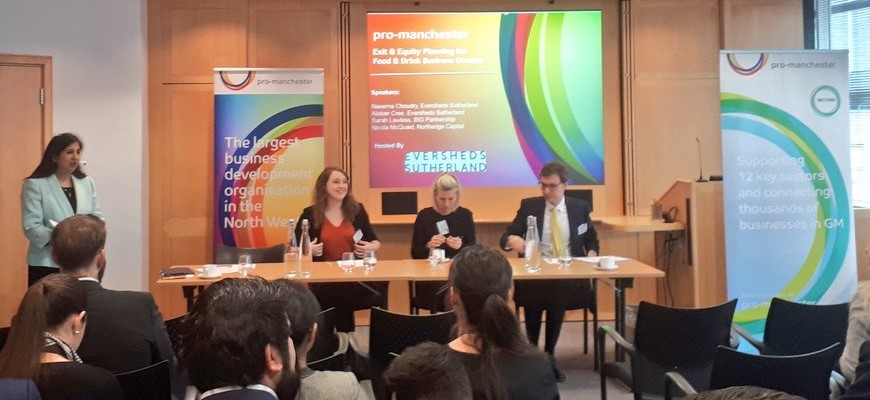Event Review: Exit and Equity Investment Planning for Food and Drink Business Owners
Tuesday, 17th April 2018By Ilona Alcock
The seminar was chaired by Naeema Choudry, Eversheds Sutherland, and provided expert advice to business owners on planning for exit or to sell equity to an investor to facilitate growth. The panellists were Alistair Cree, Eversheds Sutherland; Sarah Lawless, The Big Partnership; and Nicola McQuaid, Northedge Capital.

Planning for exit?
Choudry opened by asking whether it is worth having an exit plan, even if not necessarily considering an exit. Lawless explained that from a marketing perspective it’s all about getting the basics right: what is your offering? What are you selling and to whom? Increasingly consumers are more interested in the company’s vision and mission, as demonstrated by brands like Innocent. It is essential to do thorough market research, both desk based and with the target market, to prove the concept. This is key for investors but should be part of any business plan. If using an agency, Lawless recommends setting a clear brief and being transparent on budgets.
Cree echoed these recommendations. From a legal perspective, everything that is needed for an exit or investment is actually just good governance. For example, have you reviewed all employment and IP contracts? Are all your registers up to date? You never know when you might be approached with an offer so it makes sense to be prepared.
What factors determine whether a business will secure investment?
McQuaid believes there are four key factors to consider: the management team; the plan; the platform and the exit. Food & drink businesses are often owner managed, with tight resources, leading to potential gaps (e.g. marketing) in the team. Investors are not necessarily looking for the finished article, but they need to understand where the gaps are.
Businesses should have a tangible, visible plan with a set of actions of how they will deliver. When looking into Clear Drinks, Northedge was impressed by the high quality research which enabled them to have confidence in brand and the management team. It is important to show opportunities for investment. For example, investing £1.5m in a piece of kit showed returns within just 15 months.
Investors want to hear about potential risks and to know that there are plans in place to mitigate their impact. Exciting stories and opportunities are great, but acknowledging the downsides gives credibility.
Cree agreed it all comes down to confidence. Does the business know what it’s doing? It can be something really basic, like having a properly organised data room, to help investors/buyers know you have done the due diligence.
How is a business valued?
McQuaid joked it’s a “very precise science” whilst Cree refers to it as a “dark art”! McQuaid noted that many factors are taken into account, e.g. comparators, multiples and earnings profile. With Clearly Drinks the trend for own label branding attracted a higher multiple. Ultimately, in a competitive market though, it is the market that sets the price.
The “X Factor” must also be considered, according to Cree. There will be businesses attracting high valuations before they make a profit. There is plenty of money around in Private Equity for the right businesses. McQuaid adds that the business must be able to articulate that difference to take advantage of the trend. For example, Clearly Drinks developed sugar free, flavoured waters 12 months before the introduction of the sugar tax.
How do you prepare for exit or investment?
Lawless reminded the audience not to take their eye of the ball. The focus of marketing should still be to drive sales and maintain a healthy business. In addition, if looking for investors, businesses can start to build their profile with press around milestones, awards and position key people as thoughtleaders.
Cree advises thinking about the structure of the deal early, and how you will be paid for the business. There will be tax implications for different structures and some deals will be a mix of cash and shares, or pay out over a period of time depending on performance. This is another reason to attempt to hide skeletons: you will be tied into warranties and will have to pay out at some point.
Due diligence doesn’t sound exciting but it is essential to get the best deal. Cree suggests downloading a basic due diligence questionnaire and working through the elements that will have the most impact on the business. For example, can key staff just walk out with no restrictive covenants? Are you relying on third party consents? Are you fully compliant with relevant legislation? These can be rectified before negotiations start, or explained to potential buyers where necessary. For private equity investors, it is worth also considering the structure of the business and any restrictions on management decisions.
For food & drink businesses it can be challenging to get key contracts. It then becomes a matter of explaining the processes in place to retain customers and giving examples of facing challenges.
McQuaid advises keeping the exit plan on the agenda, ensuring regular conversations between investors and the management team. Northedge generally plan for a 3 to 5 year model, but this may be shortened if the business has met targets and the right opportunities appear.
Any trends for the Food & Drink sector?
Lawless is seeing a move towards niche markets whether based on dietary requirements (e.g. gluten free, vegan) or regionalising restaurants. The industry is becoming more visual, with video becoming ever more important. As with all sectors, there is a move towards experiences over things. Brands which position themselves as giftable or keepable are performing well. It is also increasingly important to be authentic, and to ensure all elements of the business align with the vision and mission.
Choudry closed the event, thanking all speakers and inviting delegates to continue the conversation after the event.